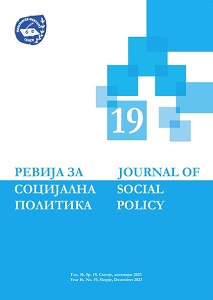Possibilities and Perspectives of Participation of Older Minors in Electoral Processes in Montenegro
Possibilities and Perspectives of Participation of Older Minors in Electoral Processes in Montenegro
Author(s): Nina Krivokapić, Mehmed ĐečevićSubject(s): Civil Society, Electoral systems, Sociology of Politics
Published by: Филозофскиот факултет во Скопје
Keywords: youth suffrage; older minors; political knowledge; political will; political participation;
Summary/Abstract: The youth population in Montenegro constitutes a demographic of strong significance for study. The theme that stands out is their involvement in conventional forms of political participation. Decreasing the voting age from 18 to 16 would enable the youth population to participate in the voting process, directly impacting policies that would affect their societal status. EU member states such as Malta, Austria, and Germany serve as strong examples of good practice with regard to the voting rights of youth. The objective of this study was to assess the political awareness and will of the youth in Montenegro to take on more societal and political responsibility, and to compare the political knowledge between newly eligible voters and older minors, in line with trends in the EU. In order to examine the attitudes of youth and obtain research findings, a combination of quantitative research through a survey and qualitative research through a semi-structured interview conducted with relevant actors such as psychologists, teachers, young people, and representatives of the non-governmental sector was conducted. The research survey was conducted on a sample of 186 participants who completed the survey online. The respondents were youth attending high school or university in the Podgorica area. The results indicate that older minors reject the idea of decreasing the voting age from 18 to 16, and that older minors have the same or comparable degree of political knowledge as young adults who are already eligible to vote. Another finding points to the fact that older minors have confidence in electoral processes but do not want to participate in them. They have a higher level of trust in the non-governmental sector and believe that it is through these organizations that they become active participants in society.
Journal: Ревија за социјална политика
- Issue Year: 2023
- Issue No: 19
- Page Range: 73-92
- Page Count: 20
- Language: English

